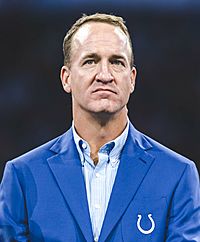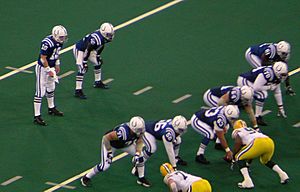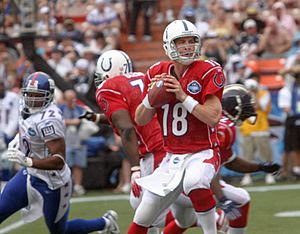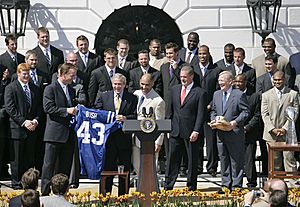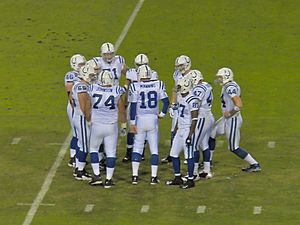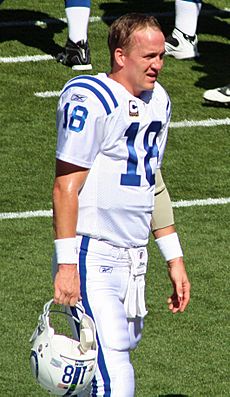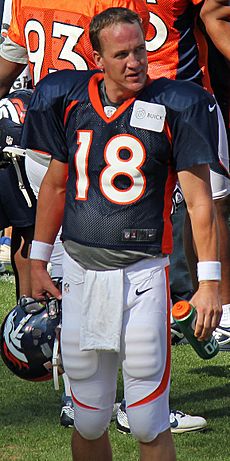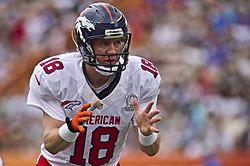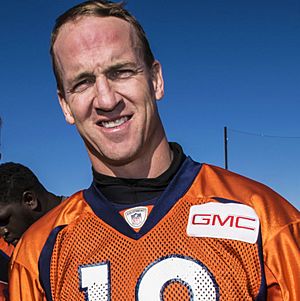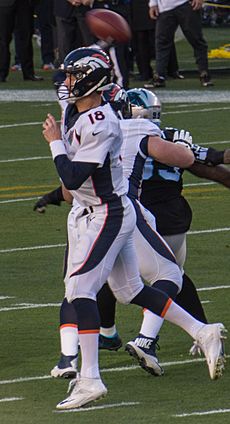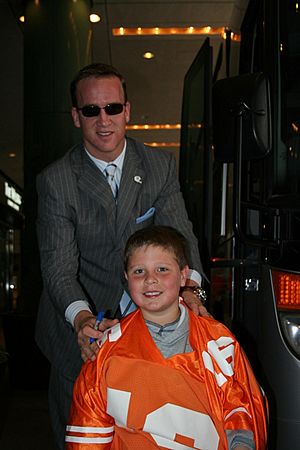Peyton Manning facts for kids
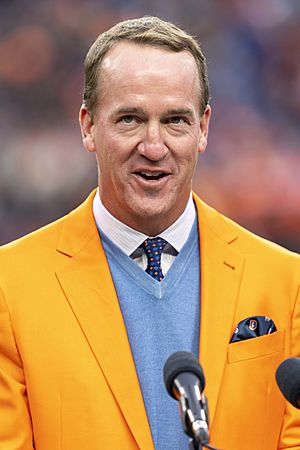
Manning in 2021
|
|||||||||||||
| No. 18 | |||||||||||||
|---|---|---|---|---|---|---|---|---|---|---|---|---|---|
| Position: | Quarterback | ||||||||||||
| Personal information | |||||||||||||
| Born: | March 24, 1976 New Orleans, Louisiana, U.S. |
||||||||||||
| Height: | 6 ft 5 in (1.96 m) | ||||||||||||
| Weight: | 230 lb (104 kg) | ||||||||||||
| Career information | |||||||||||||
| High school: | Isidore Newman (New Orleans) | ||||||||||||
| College: | Tennessee (1994–1997) | ||||||||||||
| NFL Draft: | 1998 / Round: 1 / Pick: 1 | ||||||||||||
| Career history | |||||||||||||
|
|||||||||||||
| Career highlights and awards | |||||||||||||
|
|||||||||||||
| Career NFL statistics | |||||||||||||
|
|||||||||||||
| Player stats at PFR | |||||||||||||
|
Pro Football Hall of Fame
|
|||||||||||||
|
College Football Hall of Fame
|
|||||||||||||
Peyton Williams Manning (born March 24, 1976) is a famous American former football quarterback. He played in the National Football League (NFL) for 18 seasons. People often called him "the Sheriff" because of how he controlled the game.
Peyton spent 14 seasons with the Indianapolis Colts and four with the Denver Broncos. Many consider him one of the best quarterbacks ever. He comes from a famous football family; his dad, Archie Manning, and younger brother, Eli Manning, were also NFL quarterbacks. His nephew, Arch Manning, plays college football.
Peyton played college football for the Tennessee Volunteers. He won several top awards as a senior. After college, the Colts picked him first in the 1998 NFL draft. He helped turn the Colts into a winning team, leading them to a Super Bowl championship in 2007. He was even named the Super Bowl's Most Valuable Player (MVP).
After a neck injury in 2011, he joined the Broncos. He led them to another Super Bowl win in 2016. This made him the first starting quarterback to win the Super Bowl with two different teams. Peyton holds many NFL records, including the most MVP awards. He was inducted into the College Football Hall of Fame in 2017 and the Pro Football Hall of Fame in 2021.
Contents
- Early Life and High School Football
- College Football Career
- Professional Football Career
- Indianapolis Colts Years
- Starting as a Rookie (1998)
- Building a Winning Team (1999–2002)
- First MVP Season (2003)
- Second MVP Season (2004)
- Strong Regular Seasons (2005–2007)
- Super Bowl XLI Champions (2006)
- Third MVP Season (2008)
- Fourth MVP and Super Bowl XLIV Appearance (2009)
- Final Colts Season (2010)
- Injury and Departure from Colts (2011)
- Denver Broncos Years
- Retirement
- "The Manning Bowl"
- Indianapolis Colts Years
- NFL Career Statistics
- NFL Records Held by Peyton Manning
- Awards and Honors
- Personal Life
- Other Work and Philanthropy
- See also
Early Life and High School Football
Peyton Manning grew up in New Orleans, Louisiana. He went to Isidore Newman School, where he was a star on the football team. As the starting quarterback, he led his team to an impressive 34 wins and only 5 losses.
In 1993, he was named a national player of the year. Peyton wore the number 18 jersey to honor his older brother, Cooper, who had to stop playing football due to a health issue. His younger brother, Eli, also wore the number 18. Isidore Newman School later retired the number 18 jersey to celebrate the Manning brothers. Many colleges wanted Peyton to play for them, including his dad's old school, Ole Miss.
College Football Career
Peyton chose to play college football at the University of Tennessee for the Volunteers. This surprised many fans who thought he would follow his dad to Ole Miss. He became Tennessee's all-time leading passer with 11,201 yards and 89 touchdowns. He won 39 out of 45 games as a starter, setting a new record for wins in the Southeastern Conference (SEC).
Freshman Season (1994)
As a freshman, Peyton started as the third-string quarterback. He became the starter after other quarterbacks got injured. In his first start, the Volunteers won 10–9 against Washington State. He finished his first year with 1,141 passing yards and 11 touchdowns. The team ended the season with 8 wins and 4 losses.
Sophomore Season (1995)
In 1995, the Volunteers started strong with two wins. They faced rival Florida and lost, but it was their only loss of the season. Peyton threw for 2,954 yards and 22 touchdowns. The Volunteers finished the season ranked third nationally.
Junior Season (1996)
The 1996 season saw the Volunteers ranked No. 2 early on. They lost to Florida again, and later to Memphis. However, they won their other games, including a big win in the Citrus Bowl where Peyton was named MVP. He finished the season with 3,287 passing yards and 20 touchdowns. Peyton earned his college degree in speech communication in just three years. Many thought he would enter the NFL draft, but he decided to stay for his senior year.
Senior Season (1997)
In his senior year, Peyton led the Volunteers to a 10–1 regular season record. They won the SEC Championship game in a thrilling comeback, with Peyton earning MVP honors despite an injury. The Volunteers played in the Orange Bowl but lost to Nebraska.
Peyton won many awards as a senior, including the Maxwell Award and the Davey O'Brien Award. He was a top contender for the Heisman Trophy, finishing as the runner-up. In 2005, the University of Tennessee retired his jersey number, 16. A street leading to the stadium was even renamed Peyton Manning Pass. He finished his final college season with 3,819 passing yards and 36 touchdowns.
College Honors
Peyton Manning received many honors after his college career. He was inducted into the Tennessee Athletics Hall of Fame in 2016. In 2017, he was elected to the College Football Hall of Fame in his first year of eligibility. He and his father, Archie, became the first father-son duo to both be inducted as players.
College Statistics
| Season | Team | Passing | Rushing | |||||||||
|---|---|---|---|---|---|---|---|---|---|---|---|---|
| Cmp | Att | Yds | Pct | TD | Int | Rtg | Att | Yds | Avg | TD | ||
| 1994 | Tennessee | 89 | 144 | 1,141 | 61.8 | 11 | 6 | 145.2 | 21 | −26 | −1.2 | 1 |
| 1995 | Tennessee | 244 | 380 | 2,954 | 64.2 | 22 | 4 | 146.5 | 41 | 6 | 0.1 | 5 |
| 1996 | Tennessee | 243 | 380 | 3,287 | 63.9 | 20 | 12 | 147.7 | 42 | −131 | −3.1 | 3 |
| 1997 | Tennessee | 287 | 477 | 3,819 | 60.2 | 36 | 11 | 147.7 | 49 | −30 | −0.6 | 3 |
| Career | 863 | 1,381 | 11,201 | 62.5 | 89 | 33 | 147.1 | 153 | –181 | –1.2 | 12 | |
Professional Football Career
Peyton Manning was chosen as the very first pick in the 1998 NFL draft by the Indianapolis Colts. He quickly became their starting quarterback and played for the Colts for 13 seasons. After a neck injury, he joined the Denver Broncos in 2012 and played there for four seasons. In total, he played 17 seasons in the NFL.
Peyton is known as one of the greatest NFL quarterbacks ever. He won the NFL's Most Valuable Player (MVP) award a record five times. He was also selected for the Pro Bowl 14 times and named a first-team All-Pro seven times. He led both the Colts and Broncos to the Super Bowl. He is the only quarterback to start in four Super Bowls with different head coaches each time.
Some people noted that despite his amazing regular season stats, his playoff record was not as strong. However, he won two Super Bowls, one with the Colts and one with the Broncos. His final season in 2015, while not his best statistically, ended with a Super Bowl victory thanks to the Broncos' strong defense.
Indianapolis Colts Years
Starting as a Rookie (1998)
The Colts picked Peyton Manning first in the 1998 NFL Draft. In his rookie season, he threw for 3,739 yards and 26 touchdowns. He set several NFL rookie records and was named to the NFL All-Rookie First Team. His first NFL win was against fellow rookie quarterback Ryan Leaf. The Colts struggled with a 3–13 record, but Peyton was a bright spot.
Building a Winning Team (1999–2002)
In 1999, Peyton led the Colts to a huge turnaround, winning 11 more games than the previous year. They finished 13–3 and won their division. Peyton threw for over 4,000 yards and 26 touchdowns. He was named to his first Pro Bowl. The Colts made the playoffs but lost to the Tennessee Titans.
In 2000, Peyton continued to shine, leading the league in completions, passing yards, and touchdowns. He was named to the Pro Bowl again. The Colts made the playoffs as a Wild Card team but lost in overtime.
The 2001 season saw the Colts use a fast-paced "no-huddle" offense. Peyton had another strong year with over 4,000 passing yards and 26 touchdowns. However, the team's defense struggled, and they finished with a 6–10 record.
In 2002, Tony Dungy became the Colts' new head coach. The team improved to a 10–6 record and made the playoffs. Peyton was named to the Pro Bowl. However, the Colts lost their first playoff game 41–0.
First MVP Season (2003)
The 2003 Colts started the season with five straight wins. In one game, Peyton threw six touchdown passes and had a perfect passer rating. In a memorable game against the Tampa Bay Buccaneers, the Colts came back from being down 35–14 in the final five minutes to win 38–35 in overtime. This was a historic comeback.
Peyton was named the NFL co-MVP (Most Valuable Player) for the first time. He led the league in passing yards and completions. In the playoffs, he led the Colts to two wins, including a game where he threw five touchdowns. However, they lost to the New England Patriots in the AFC Championship.
Second MVP Season (2004)
The 2004 season was incredible for Peyton. He set new NFL records for passing touchdowns in a season with 49 and had an amazing passer rating of 121.1. He was named NFL MVP for the second year in a row. He also won NFL Offensive Player of the Year. The Colts scored a franchise record 522 points.
In one game, he led a comeback from 15 points down in the fourth quarter to win. He broke Dan Marino's touchdown record in that game. The Colts finished 12–4 and won their division. They won their first playoff game but again lost to the New England Patriots.
Strong Regular Seasons (2005–2007)
In 2005, the Colts had a much better defense. They won their first 13 games, including a big win over the Patriots. Peyton finished the season with a league-high quarterback rating. However, they lost in the playoffs to the Pittsburgh Steelers in a close game. Peyton won the Walter Payton NFL Man of the Year Award for his community work.
The 2006 season started with a special game where Peyton played against his brother Eli for the first time. The Colts won. Peyton led the league with 31 touchdown passes. The Colts were 9–0 before their first loss. They won their division and were the third seed in the playoffs.
Super Bowl XLI Champions (2006)
In the 2006 playoffs, the Colts beat the Kansas City Chiefs and Baltimore Ravens. In the AFC Championship game, they faced the New England Patriots. The Colts were down 21–3 but Peyton led an amazing comeback, scoring 32 points in the second half to win 38–34. This was the biggest comeback ever in a conference championship.
Peyton then led the Colts to a 29–17 victory over the Chicago Bears in Super Bowl XLI. He was named the Super Bowl MVP, becoming the first Colts player to win this award.
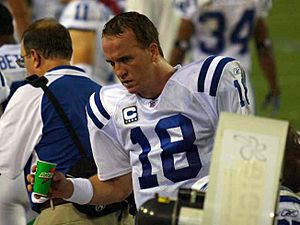
The 2007 season started with seven straight wins. They faced the undefeated New England Patriots and lost a close game. Peyton finished the season with over 4,000 passing yards and 31 touchdowns. The Colts won their division again but lost in the Divisional Round of the playoffs to the San Diego Chargers.
Third MVP Season (2008)
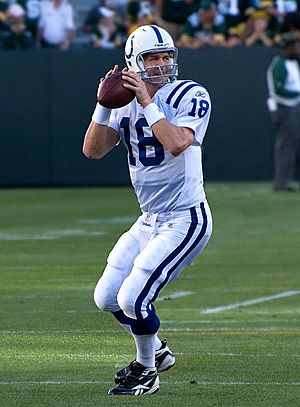
Peyton had knee surgery before the 2008 season. The Colts started 1–2, but Peyton led them to a historic comeback against the Houston Texans, scoring three touchdowns in just over two minutes to win. This was the first time an NFL team won after trailing by 17 points in the last five minutes of a game.
The Colts went on a seven-game winning streak. Peyton won AFC Offensive Player of the Week three times that season. He set an NFL record with 11 seasons having 25 or more touchdown passes. At the end of the season, Peyton was named NFL MVP for the third time, tying Brett Favre for the most MVP awards ever. The Colts made the playoffs but lost to the San Diego Chargers in overtime. After this season, coach Tony Dungy retired.
Fourth MVP and Super Bowl XLIV Appearance (2009)
Under new coach Jim Caldwell, Peyton led the Colts to a fantastic 14–2 record. They won their first 14 games, setting an NFL record for consecutive regular season wins (23 games) that stretched from the previous season. Peyton became the first quarterback to throw over 40,000 yards in a single decade. He finished the season with 4,500 passing yards and 33 touchdowns.
Peyton won his fourth MVP award, breaking the NFL record for most MVPs by a single player. The Colts reached Super Bowl XLIV to face the New Orleans Saints. The Colts took an early lead, but the Saints came back. A key interception by the Saints in the fourth quarter led to a touchdown, and the Saints won 31–17.
Final Colts Season (2010)
In 2010, Peyton set a career high with 450 completions and 4,700 passing yards. He led the Colts to their seventh AFC South title in eight years. He also became the first quarterback to lead his team to nine straight playoff appearances. The Colts' season ended with a close 17–16 loss to the New York Jets in the Wild Card Round of the playoffs.
Injury and Departure from Colts (2011)
Peyton had neck surgery in May 2011. He was unable to play during the 2011 season. Without him, the Colts struggled, finishing with only 2 wins and 14 losses. Because the Colts had the first pick in the 2012 NFL Draft and Peyton was due a large bonus, the team decided to release him on March 7, 2012. In an emotional press conference, Peyton thanked Colts fans. The Colts announced that no player would ever wear his number 18 jersey again.
Denver Broncos Years
After leaving the Colts, Peyton was a highly sought-after free agent. He chose to sign with the Denver Broncos on March 20, 2012. The Broncos' retired number 18, worn by quarterback Frank Tripucka, was given to Peyton with Tripucka's permission.
Comeback Player of the Year (2012)
Peyton made his Broncos debut against the Pittsburgh Steelers, throwing two touchdowns in a 31–19 win. One of his touchdowns was his 400th career touchdown pass, making him the fastest quarterback to reach that milestone. In a game against the San Diego Chargers, the Broncos were down 24–0 at halftime, but Peyton led them to 35 unanswered points and a 35–24 victory.
He was named the NFL Comeback Player of the Year for his amazing return. He finished the season with 4,659 passing yards and 37 touchdowns, setting new Broncos franchise records. The Broncos made the playoffs but lost in double overtime to the Baltimore Ravens.
Fifth MVP and Super Bowl XLVIII Appearance (2013)
The 2013 season was historic for Peyton. In the very first game, he threw seven touchdown passes against the Baltimore Ravens, becoming one of only two players in NFL history to have a 7:0 touchdown to interception ratio in a game. He broke the record for most touchdown passes in the first three games of a season with 12.
He returned to Indianapolis to play against his former team, the Colts, in an emotional game. The Colts showed a tribute video to him before the game.
In Week 16, Peyton broke Tom Brady's record for most touchdown passes in a season, finishing with an incredible 55 touchdowns. He also set a new league record for passing yards in a season with 5,477 yards. The Broncos scored an NFL record 606 points that season.
Peyton won his fifth NFL MVP award, extending his own record. The Broncos defeated the San Diego Chargers and the New England Patriots in the playoffs to reach Super Bowl XLVIII. This made Peyton the third starting quarterback to reach the Super Bowl with two different teams. However, the Broncos lost to the Seattle Seahawks 43–8 in the Super Bowl.
All-Time Passing Touchdowns Leader (2014)
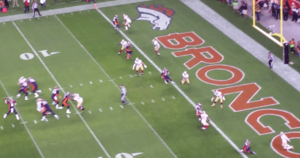
In 2014, Peyton became one of only two starting quarterbacks to have beaten all 32 NFL teams. On October 19, 2014, he threw his 509th career touchdown pass, breaking Brett Favre's record to become the NFL's all-time leader in passing touchdowns. He finished the season with 4,727 passing yards and 39 touchdowns. He was selected to his 14th Pro Bowl, tying the record for most Pro Bowl selections. The Broncos won their division but lost in the Divisional Round of the playoffs to his former team, the Colts.
Super Bowl 50 Champions (2015)
Peyton returned for his 18th NFL season in 2015. The Broncos started strong with a 7–0 record. In Week 10, Peyton broke Brett Favre's record for career passing yards. However, he struggled in that game and was benched due to injury. Brock Osweiler took over as the starting quarterback for several games.
Peyton returned to play in Week 17, helping the Broncos secure the top seed in the AFC playoffs. Despite having his lowest statistical season, the Broncos finished 12–4.
In the playoffs, the Broncos defeated the Pittsburgh Steelers and then faced his longtime rival Tom Brady and the New England Patriots in the AFC Championship game. The Broncos won 20–18, sending Peyton to Super Bowl 50.
On February 7, 2016, the Broncos defeated the Carolina Panthers 24–10 in Super Bowl 50. Peyton became the oldest starting quarterback to win a Super Bowl at age 39. He also became the first quarterback to lead two different teams to Super Bowl victories. This win gave Peyton his 200th overall victory (including regular season and playoffs), making him the starting quarterback with the most combined wins in NFL history at the time.
Retirement
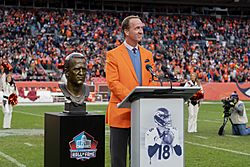
Peyton Manning announced his retirement from football on March 7, 2016, after 18 seasons. He received the ESPY Icon Award for his career.
In 2017, the Colts unveiled a bronze statue of Peyton outside their stadium and retired his number 18 jersey. In 2019, he was named to the NFL 100 All-Time Team, which honors the greatest players in NFL history.
On February 6, 2021, Peyton was elected into the Pro Football Hall of Fame in his first year of eligibility. He was also inducted into the Denver Broncos Ring of Fame in 2021.
"The Manning Bowl"
Peyton and his younger brother, Eli Manning, played against each other three times in regular season games. These games were nicknamed "The Manning Bowl." Peyton's teams won all three matchups. The first was in 2006, the second in 2010, and the third in 2013. They never played against each other in the Super Bowl because they were in different conferences.
NFL Career Statistics
| Legend | |
|---|---|
| AP NFL MVP | |
| Super Bowl MVP | |
| Won the Super Bowl | |
| NFL record | |
| Led the league | |
| Bold | Career high |
Regular Season Stats
| Year | Team | Games | Passing | Rushing | Sacked | Fumbles | |||||||||||||||||
|---|---|---|---|---|---|---|---|---|---|---|---|---|---|---|---|---|---|---|---|---|---|---|---|
| GP | GS | Record | Cmp | Att | Pct | Yds | Y/A | Y/G | Lng | TD | Int | Rtg | Att | Yds | Y/A | Lng | TD | Sck | SckY | Fum | Lost | ||
| 1998 | IND | 16 | 16 | 3–13 | 326 | 575 | 56.7 | 3,739 | 6.5 | 233.7 | 78 | 26 | 28 | 71.2 | 15 | 62 | 4.1 | 15 | 0 | 22 | 109 | 3 | 1 |
| 1999 | IND | 16 | 16 | 13–3 | 331 | 533 | 62.1 | 4,135 | 7.8 | 258.4 | 80 | 26 | 15 | 90.7 | 35 | 73 | 2.1 | 13 | 2 | 14 | 116 | 6 | 3 |
| 2000 | IND | 16 | 16 | 10–6 | 357 | 571 | 62.5 | 4,413 | 7.7 | 275.8 | 78 | 33 | 15 | 94.7 | 37 | 116 | 3.1 | 14 | 1 | 20 | 131 | 5 | 2 |
| 2001 | IND | 16 | 16 | 6–10 | 343 | 547 | 62.7 | 4,131 | 7.6 | 258.2 | 86 | 26 | 23 | 84.1 | 35 | 157 | 4.5 | 33 | 4 | 29 | 232 | 7 | 3 |
| 2002 | IND | 16 | 16 | 10–6 | 392 | 591 | 66.3 | 4,200 | 7.1 | 262.5 | 69 | 27 | 19 | 88.8 | 38 | 148 | 3.9 | 13 | 2 | 23 | 145 | 6 | 2 |
| 2003 | IND | 16 | 16 | 12–4 | 379 | 566 | 67.0 | 4,267 | 7.5 | 266.7 | 79 | 29 | 10 | 99.0 | 28 | 26 | 0.9 | 10 | 0 | 18 | 107 | 6 | 1 |
| 2004 | IND | 16 | 16 | 12–4 | 336 | 497 | 67.7 | 4,557 | 9.2 | 284.8 | 80 | 49 | 10 | 121.1 | 25 | 38 | 1.5 | 19 | 0 | 13 | 101 | 5 | 1 |
| 2005 | IND | 16 | 16 | 14–2 | 305 | 453 | 67.3 | 3,747 | 8.3 | 234.2 | 80 | 28 | 10 | 104.1 | 33 | 45 | 1.4 | 12 | 0 | 17 | 81 | 5 | 2 |
| 2006 | IND | 16 | 16 | 12–4 | 362 | 557 | 65.0 | 4,397 | 7.9 | 274.8 | 68 | 31 | 9 | 101.0 | 23 | 36 | 1.6 | 12 | 4 | 14 | 86 | 2 | 1 |
| 2007 | IND | 16 | 16 | 13–3 | 337 | 515 | 65.4 | 4,040 | 7.8 | 252.5 | 73 | 31 | 14 | 98.0 | 20 | −5 | −0.3 | 4 | 3 | 21 | 124 | 6 | 1 |
| 2008 | IND | 16 | 16 | 12–4 | 371 | 555 | 66.8 | 4,002 | 7.2 | 250.1 | 75 | 27 | 12 | 95.0 | 20 | 21 | 1.1 | 12 | 1 | 14 | 86 | 1 | 0 |
| 2009 | IND | 16 | 16 | 14–2 | 393 | 571 | 68.8 | 4,500 | 7.9 | 281.3 | 80 | 33 | 16 | 99.9 | 19 | −13 | −0.7 | 3 | 0 | 10 | 74 | 2 | 0 |
| 2010 | IND | 16 | 16 | 10–6 | 450 | 679 | 66.3 | 4,700 | 6.9 | 293.8 | 73 | 33 | 17 | 91.9 | 18 | 18 | 1.0 | 27 | 0 | 16 | 91 | 3 | 1 |
| 2011 | IND | 0 | 0 | — | Did not play due to injury | ||||||||||||||||||
| 2012 | DEN | 16 | 16 | 13–3 | 400 | 583 | 68.6 | 4,659 | 8.0 | 291.2 | 71 | 37 | 11 | 105.8 | 23 | 6 | 0.3 | 10 | 0 | 21 | 137 | 2 | 2 |
| 2013 | DEN | 16 | 16 | 13–3 | 450 | 659 | 68.3 | 5,477 | 8.3 | 342.3 | 78 | 55 | 10 | 115.1 | 32 | −31 | −1.0 | 1 | 1 | 18 | 120 | 10 | 6 |
| 2014 | DEN | 16 | 16 | 12–4 | 395 | 597 | 66.2 | 4,727 | 7.9 | 295.4 | 86 | 39 | 15 | 101.5 | 24 | −24 | −1.0 | 4 | 0 | 17 | 118 | 5 | 2 |
| 2015 | DEN | 10 | 9 | 7–2 | 198 | 331 | 59.8 | 2,249 | 6.8 | 224.9 | 75 | 9 | 17 | 67.9 | 6 | −6 | −1.0 | −1 | 0 | 16 | 95 | 1 | 0 |
| Career | 266 | 265 | 186–79 | 6,125 | 9,380 | 65.3 | 71,940 | 7.7 | 270.5 | 86 | 539 | 251 | 96.5 | 431 | 667 | 1.5 | 33 | 18 | 303 | 1,953 | 75 | 28 | |
Postseason Stats
| Year | Team | Games | Passing | Rushing | Sacked | Fumbles | |||||||||||||||||
|---|---|---|---|---|---|---|---|---|---|---|---|---|---|---|---|---|---|---|---|---|---|---|---|
| GP | GS | Record | Cmp | Att | Pct | Yds | Y/A | Y/G | Lng | TD | Int | Rtg | Att | Yds | Y/A | Lng | TD | Sck | SckY | Fum | Lost | ||
| 1999 | IND | 1 | 1 | 0–1 | 19 | 42 | 45.2 | 227 | 5.4 | 227.0 | 33 | 0 | 0 | 62.3 | 3 | 22 | 7.3 | 15 | 1 | 0 | 0 | 0 | 0 |
| 2000 | IND | 1 | 1 | 0–1 | 17 | 32 | 53.1 | 194 | 6.1 | 194.0 | 30 | 1 | 0 | 82.0 | 1 | −2 | −2.0 | −2 | 0 | 0 | 0 | 0 | 0 |
| 2002 | IND | 1 | 1 | 0–1 | 14 | 31 | 45.2 | 137 | 4.4 | 137.0 | 17 | 0 | 2 | 31.2 | 1 | 2 | 2.0 | 2 | 0 | 1 | 13 | 0 | 0 |
| 2003 | IND | 3 | 3 | 2–1 | 67 | 103 | 65.0 | 918 | 8.9 | 306.0 | 87 | 9 | 4 | 106.4 | 4 | 3 | 0.8 | 3 | 0 | 5 | 41 | 1 | 0 |
| 2004 | IND | 2 | 2 | 1–1 | 54 | 75 | 72.0 | 696 | 9.3 | 348.0 | 49 | 4 | 2 | 107.4 | 2 | 7 | 3.5 | 7 | 1 | 2 | 12 | 1 | 0 |
| 2005 | IND | 1 | 1 | 0–1 | 22 | 38 | 57.9 | 290 | 7.6 | 290.0 | 50 | 1 | 0 | 90.9 | 0 | 0 | — | 0 | 0 | 5 | 43 | 0 | 0 |
| 2006 | IND | 4 | 4 | 4–0 | 97 | 153 | 63.4 | 1,034 | 6.8 | 258.5 | 53 | 3 | 7 | 70.5 | 8 | 3 | 0.4 | 7 | 1 | 6 | 41 | 1 | 1 |
| 2007 | IND | 1 | 1 | 0–1 | 33 | 48 | 68.7 | 402 | 8.4 | 402.0 | 55 | 3 | 2 | 97.7 | 1 | −6 | −6.0 | −6 | 0 | 0 | 0 | 0 | 0 |
| 2008 | IND | 1 | 1 | 0–1 | 25 | 42 | 59.5 | 310 | 7.4 | 310.0 | 72 | 1 | 0 | 90.4 | 1 | −1 | −1.0 | −1 | 0 | 1 | 8 | 0 | 0 |
| 2009 | IND | 3 | 3 | 2–1 | 87 | 128 | 68.0 | 956 | 7.5 | 318.7 | 46 | 6 | 2 | 99.0 | 3 | −2 | −0.6 | 0 | 0 | 4 | 30 | 0 | 0 |
| 2010 | IND | 1 | 1 | 0–1 | 18 | 26 | 69.2 | 225 | 8.7 | 225.0 | 57 | 1 | 0 | 108.7 | 0 | 0 | — | 0 | 0 | 1 | 6 | 0 | 0 |
| 2012 | DEN | 1 | 1 | 0–1 | 28 | 43 | 65.1 | 290 | 6.7 | 290.0 | 32 | 3 | 2 | 88.3 | 1 | −1 | −1.0 | −1 | 0 | 3 | 17 | 2 | 1 |
| 2013 | DEN | 3 | 3 | 2–1 | 91 | 128 | 71.1 | 910 | 7.1 | 303.3 | 37 | 5 | 3 | 94.2 | 3 | −2 | −0.7 | 0 | 0 | 1 | 1 | 1 | 1 |
| 2014 | DEN | 1 | 1 | 0–1 | 26 | 46 | 56.5 | 211 | 4.6 | 211.0 | 32 | 1 | 0 | 75.5 | 0 | 0 | — | 0 | 0 | 2 | 11 | 1 | 1 |
| 2015 | DEN | 3 | 3 | 3–0 | 51 | 92 | 55.4 | 539 | 5.9 | 179.7 | 34 | 2 | 1 | 75.4 | 5 | 10 | 2.0 | 12 | 0 | 9 | 75 | 4 | 2 |
| Career | 27 | 27 | 14–13 | 649 | 1,027 | 63.2 | 7,339 | 7.1 | 271.8 | 87 | 40 | 25 | 87.4 | 33 | 34 | 1.0 | 15 | 3 | 40 | 298 | 11 | 6 | |
Super Bowl Stats
| Year | SB | Team | Opp. | Passing | Result | |||||||
|---|---|---|---|---|---|---|---|---|---|---|---|---|
| Cmp | Att | Pct | Yds | Y/A | TD | Int | Rtg | |||||
| 2006 | XLI | IND | CHI | 25 | 38 | 65.8 | 247 | 6.5 | 1 | 1 | 81.8 | W 29–17 |
| 2009 | XLIV | IND | NO | 31 | 45 | 68.9 | 333 | 7.4 | 1 | 1 | 88.5 | L 31–17 |
| 2013 | XLVIII | DEN | SEA | 34 | 49 | 69.4 | 280 | 5.7 | 1 | 2 | 73.5 | L 43–8 |
| 2015 | 50 | DEN | CAR | 13 | 23 | 56.5 | 141 | 6.1 | 0 | 1 | 56.6 | W 24–10 |
| Career | 103 | 155 | 66.5 | 1,001 | 6.5 | 3 | 5 | 77.4 | W−L 2–2 | |||
NFL Records Held by Peyton Manning
Peyton Manning holds many impressive NFL records:
- Most NFL MVP Awards: 5 (2003, 2004, 2008, 2009, 2013)
- Most First-Team All-Pro selections for a quarterback: 7
- First quarterback to reach 200 career wins (including playoffs and regular season)
- Most touchdown passes in a single season: 55 (2013)
- Most seasons with at least 4,000 passing yards: 14
- Most passing yards in a single season: 5,477 (2013)
- Most NFL teams beaten: 32 (tied with Brett Favre, Drew Brees, and Tom Brady)
- Most consecutive seasons with at least 25 touchdown passes: 13
- Most games with a perfect passer rating: 4 (including 1 playoff game)
- Most consecutive games started to open a career: 208
- Most consecutive games with at least 2 touchdown passes: 15
- Most games with at least four touchdown passes in a season: 9 (2013)
- Only quarterback with at least six touchdown passes in three different games
- One of eight quarterbacks with at least seven touchdown passes in a game
- Most consecutive regular season wins as a starter: 23
Awards and Honors
NFL
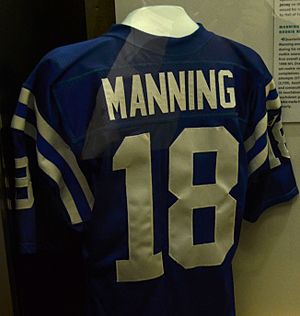
- Two-time Super Bowl champion (XLI, 50)
- Five-time NFL MVP (record)
- Two-time NFL Offensive Player of the Year
- 14-time Pro Bowl selection
- Seven-time First-Team All-Pro
- 1998 NFL All-Rookie First Team
- 2005 Walter Payton Man of the Year Award
- 2007 Super Bowl MVP
- 2012 NFL Comeback Player of the Year
- Number 18 retired by the Indianapolis Colts and Denver Broncos
- Statue outside Lucas Oil Stadium in Indianapolis
NCAA
- 1997 Consensus All-American
- 1997 Maxwell Award winner
- 1997 Davey O'Brien Award winner
- 1997 Johnny Unitas Golden Arm Award winner
- Number 16 retired by the Tennessee Volunteers
Halls of Fame
- College Football Hall of Fame inductee (2017)
- Pro Football Hall of Fame inductee (2021)
- Colorado Sports Hall of Fame (2018)
- Indiana Sports Hall of Fame (2020)
- Louisiana Sports Hall of Fame (2019)
- Tennessee Sports Hall of Fame (2019)
Media
- 2013 Sports Illustrated Sportsman of the Year
- Five-time ESPY Award winner, including three times as Best NFL Player
Personal Life
Peyton Manning was born in New Orleans, Louisiana. He is the second son of Archie Manning, a former NFL quarterback. His younger brother, Eli Manning, also became a two-time Super Bowl champion quarterback. The Mannings are often called football's "royal family."
Peyton married his wife, Ashley, in 2001. They have twins, a son named Marshall and a daughter named Mosley, born in 2011. The family lives in Denver, Colorado.
Peyton is a Christian. He has said that his priorities are "faith, family, friends, and football." He prays every night and before games.
During the summer, Peyton, his father Archie, and his brothers Eli and Cooper run the Manning Passing Academy. This is a five-day camp that helps young football players improve their skills.
Peyton earned the nickname "the Sheriff" during his professional career. This nickname came from a TV broadcast in 2009, where an analyst described how Peyton would take charge at the line of scrimmage during games.
The University of Tennessee offers a Peyton Manning Scholarship to new students in his honor.
Other Work and Philanthropy
Peyton Manning is known for his positive impact off the field. He is credited with helping to improve the city of Indianapolis. Many believe that without him, the city might not have hosted Super Bowl XLVI or built Lucas Oil Stadium.
He has been a popular figure in commercials and advertisements. In 2007, he hosted NBC's Saturday Night Live, which was very popular. He has also appeared on the show multiple times since.
Peyton has also lent his voice to animated characters, including Guapo in the 2017 movie Ferdinand.
He hosts Peyton's Places, a documentary series about football on ESPN+. This show is produced by his own company, Omaha Productions, named after his famous audible call. Through his company, he also produces other sports documentaries. In 2021, Peyton and Eli started hosting the Manningcast, an alternative broadcast of Monday Night Football on ESPN2, featuring special guests.
In 2023, it was announced that Peyton would join the University of Tennessee as a professor in the College of Communication and Information. In 2025, he joined the ownership group of the National Women's Soccer League team Denver Summit FC.
Giving Back to the Community
Shortly after starting his NFL career, Peyton created his own charity called the Peyback Foundation. This foundation helps disadvantaged children in Louisiana, Tennessee, Indiana, and Colorado. For his work, Peyton received an award for public service.
Peyton and his brother Eli also helped after Hurricane Katrina in New Orleans. They delivered supplies like water, Gatorade, and baby formula to people affected by the hurricane.
In 2007, St. Vincent Indianapolis Hospital renamed its children's hospital to Peyton Manning Children's Hospital at St. Vincent. Peyton and his wife made a donation to the hospital and have a strong relationship with it.
In 2022, the Peyback Foundation started scholarships at six historically black colleges and universities. They also launched a scholarship with Georgia Tech to honor Peyton's former Broncos teammate, Demaryius Thomas.
See also
 In Spanish: Peyton Manning para niños
In Spanish: Peyton Manning para niños
- Tom Brady–Peyton Manning rivalry
- List of first overall National Football League draft picks
- List of National Football League career passing completions leaders
- List of National Football League career quarterback wins leaders
- List of Super Bowl starting quarterbacks
 | George Robert Carruthers |
 | Patricia Bath |
 | Jan Ernst Matzeliger |
 | Alexander Miles |


